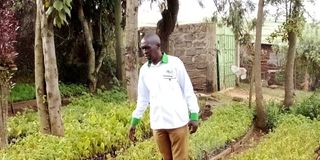Biz Lounge: How a profitable business sprouted from tree seedlings in Mau Narok

Joseph Kimani inspects tree seedlings at his fam in mau Narok.
The government's call for Kenyans to plant trees and increase the country's forest cover to 10 percent is a boon for seedling farmers.
Many have made a killing with every National day of planting trees that has been announced.
One such person is Joseph Kimani who lives in Mau Narok. His farm has more than 5,000 seedlings which include tree tomato fruit seedlings and forest trees.
Kimani is a versatile and proactive entrepreneur who sells over 50,000 tree seedlings yearly.
However, he explains that the cost depends on several factors, such as the species to be nurtured, access to water, labour costs, and land ownership.
Kimani revealed that the tree seedling business is profitable and urged the youth to embrace the culture.
"Our customers are individuals interested in investing in the fruit business, homeowners looking to beautify their gardens, and organizations purchasing shade trees as part of climate-smart initiatives to combat climate change," he says.
He notes that he has over 5,000 tree seedlings at his farm, which he sells at Sh 30 each for tree seedlings while Sh. 50 for tree tomato fruit tree seedlings.
Kimani notes that it's important for tree seedling entrepreneurs to boost their knowledge on types of trees, care, and management and their uses.
“Those in the tree seedling business can get this information from the internet or engage experts,” Kimani advises.
Asked about the capital needed to start this business, Kimani notes that capital depends on the size of the nursery and the types of trees noting that one must get seeds from certified seed outlets like Kenya Forest Research Institute (KEFRI).
“I began my business with approximately Sh 12,000. I first set my seed bed using fumigated or treated and seasoned forest soil until the germinated plants were ready before I put them in tubes,” said Kimani.
He adds that then sorting is done, where plants are arranged according to their types and those that need different attention are set according to their requirements
Kimani says that a farmer who wants to run a retail or wholesaler's nursery has to get certification from the relevant bodies, like Kenya Plant Health Inspectorate Service (Kephis) and Kenya Forest Service before starting the project.
He concludes by encouraging residents to heed the directives given by the government to plant trees to conserve our environment.
